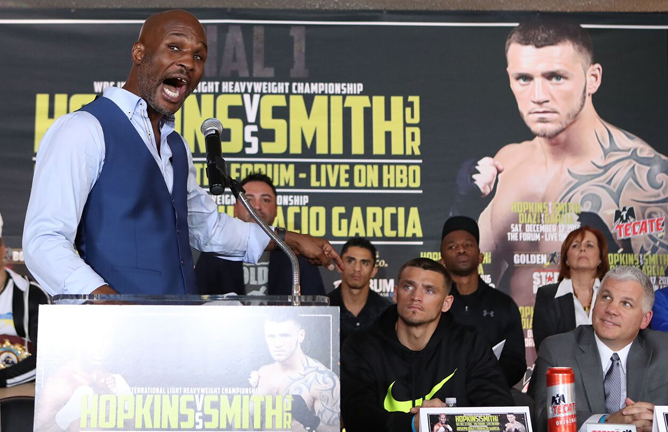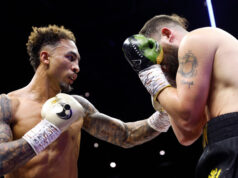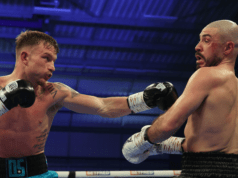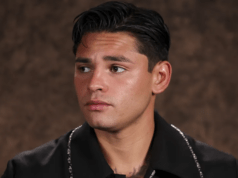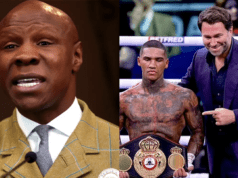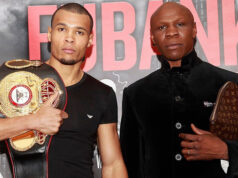Placing an exclamation point at the end of a decades long career, former two-division world champion and future Hall of Famer Bernard “The Executioner” Hopkins (55-7 2, 32 KOs) will be delivering a performance reflective of his extensive career taking on the best as he faces Joe Smith, Jr. (22-1, 18 KOs) this Saturday, Dec. 17 on HBO World Championship Boxing®.
Hopkins will be entering the ring for his last hoorah in true Hopkins style by closing out the book with a match up that will demonstrate his evolution as a fighter and his daring persona.
“The Executioner” sat down with Doug Fisher from Ring TV, and discussed some of the pivotal moments in his extensive career where Hopkins has defied the odds stacked against him and thrived on being the underdog.
DOUG FISHER: You’re an all-time great – you dare to be great. You’ve been out of the ring for almost two years now, over 50 years old, at a place in your career where nobody would fault you if you wanted to make your last hoorah an easy one, yet you have decided to go up against Joe Smith, Jr. – someone who is ranked in the light heavy weight
division, who has a powerful punch. A lot of people have asked you ‘why get in the ring with someone 17 years younger than you?’ Why?
BERNARD HOPKINS: “I dare to be great. This fight is no exception. Yes, I have had some time off, but not in the way I feel where I wouldn’t be able to take him down. Because this is my last fight it has to be with a guy like Joe Smith Jr., who presents a very serious threat not only to my legacy, but also to my health. But I recognize that in order to get the sendoff that I want, I want to show people in boxing and around the world that age is not a factor. I just have that one thing to prove. This will be the Final 1.”
FISHER: You have broken all types of records – even your own. Do you still need a guy that is perceived to be a threat to be motivated at this stage of your career?
HOPKINS: “I do – and that’s why I need someone like Joe Smith, Jr. who is a prime candidate and a threat. I say legacy, and I say that based on my wins and losses. I know I have the strength within me to do a final one based on my legacy. My legacy is what moves me, what keeps me aware of anything that doesn’t say ‘W’. It keeps me aware of anything that takes away whatever percentage away from that legacy. I am a proud champion. I am a competitor. You must go in the ring with that mentality. One fight doesn’t change 28 years of hard work or to being a future Hall of Famer or not being legendary.
“This fight is different and the fans have to know this is not a salesmanship. I think I have gone on to sell a lot, and I think I have delivered more than I have sold. This is the last memory of Bernard Hopkins in the ring. Yes, we can talk about the past fights, about the past legacy, about the past belts, the unification, the attempt to unify the light heavy weight division. But they will remember the last chapter of the book the most. This book was good when it started off, it got greater in the middle, but the end – that’s what stays in your mind when you go to sleep at night, and when you tell somebody about this book named Bernard Hopkins, “The Executioner” Hopkins, This is a real profound statement to the world, not only just boxing, that I am and will be recognized for always being different There will be no more punches being thrown in the square ring.”
FISHER: You received your nickname “The Alien” because of your age, its other-worldliness that is not human, but the nickname the executioner was given to you when you were in your prime run, when you were knocking guys out. Is that the mindset you are going in with this fight?
HOPKINS: “I haven’t had a knock out since Oscar De La Hoya. I haven’t had a knock out in almost ten to twelve years. Being on this drought, of TKO-ing or KO-ing my opponent, about to face this guy from Long Island, that to me is something to get my juices flowing, and it’s a risk, I am running to fire, I am running to the challenge in and outside the ring.”
FISHER: There aren’t many elite boxers who are esteemed to be the underdogs in a fight. You were the 3-1 underdog for Felix Trinidad, 3-1 underdog for Antonio Tarver 3-1 against Kelly Pavlik, 3-1 underdog against John Pascal, among many of your other fights. How does that affect you in this fight?
HOPKINS: “I was born into the underdog title. Jan. 15, 1965, in an era that was not so nice to colored people, I was born to Shirley Hopkins. To be born on Jan. 15 on King’s day, in America and avoid somehow the trash can because I was Black – I was born in the underdog time in America. I was born in the underdog, adolescence I was born into that trap and I fell into that trap. When the underdog comes out with only a jail house GED and the education that he has, with only the support I have and have had to come home to. That foundation has built this story. In the nine years that I had after I got out, that built the foundation as to where I am today. I came through this thing not having a chance through the statistics.”
FISHER: When you got out of Graterford prison, did you make a promise to yourself that you were going to get yourself educated, get yourself ahead, regardless of being a professional boxer, successful or not? Did you believe you could become a world champion at that level?
HOPKINS: “Did I foresee this in my future? No I did not. My entire objective was to look that far into the distance, but to stay out of trouble. Knowing that I had to see the parole man twice a month, having to do my drug tests when years of temptations came every week was very hard. Back in the 80s and 90s, it was all about the fast money, it didn’t matter if you were on the west coast or in the east coast. I came out of prison just wanting to fight, stay out of trouble, and in 1988 and lost to a forerunner. I wanted to get into the mix fast, so that I would not get distracted.”
FISHER: After your first loss to Mitchell, you took a year off. You found Huey Fisher and a couple of odd jobs. How did that year off look for you?
HOPKINS: “I worked at the Penn Tower Hotel in the kitchen, and then I worked a roofing job. That year and some months were really crucial. From the years ’88 to ’89 to ’90, all the guys that I grew up in my neighborhood were in the fast money – I could have taken that road. But I made the decision to dedicate that special time in the gym with Huey Fisher through Rob Merrick. The two of them formed a company called ‘Arise in Boxing’, and from that, and meeting Huey, and having some amateur experience in boxing jail – that was my biggest resume. When Huey first met me, his reaction was, ‘Ooh, you’re a little heavy.’ And I wasn’t heavy I was just six foot weighing in at 185. Fisher looked at me, and saw that I could make 160.”
FISHER: Huey Fisher was done with boxing by the time you started training with him, he was fed up. How was your experience training with him?
HOPKINS: “It takes a man who doesn’t want to do boxing to have that eye to see every little thing that you are doing wrong. When he looked at me and saw a light heavyweight, I didn’t know 90 percent of the boxing intelligence I know now. Huey Fisher really saw it before anyone else did.”
FISHER: What are your top three biggest moments in boxing?
HOPKINS: “In 2001 – the circumstances, the underdog, the flag went down, a lot of hype, two weeks after 9/11 – Felix Trinidad. That was a historic moment in a lot of ways. Next would be the De La Hoya fight. Right behind De La Hoya would be Pavlik which happened in between the Trinidad and De La Hoya fight and made them respect me even more. Pavlik and just defeated someone who had a better record than me, and when I got into the ring with him, that artwork on display – man! This fight, people were very open and vocal about what they thought was going to happen to me. He was the middleweight champ who was undefeated – I was the 3-1 underdog. I wanted to take on the challenge and shut him down. That’s why you got to do with the young boxers.”
FISHER: Was there any point last year, 2015, where you decided to give up the idea of singing the last song, where you finished your transition into becoming a full time broadcaster?
HOPKINS: “If I wouldn’t have taken a fight the end of this year, or at the beginning of next year, the years would have just passed and I wouldn’t have gotten back into the ring. My thing is, the fight happened, the fight is the way I wanted it, the way I wanted to go out. I deserve to go out like Kobe Bryant. This is taking a page out of respect of the book for athletes who put in the points for their teams. Whether there was a title or no title, this is the final one. Every round that goes by, that’s important to my legacy that I go out the way that I want to be remembered. You write your own exit. Come Dec.17, that is exactly what I am doing, writing my own exit.”


